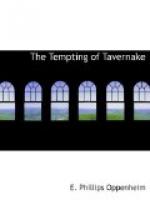“Elizabeth doesn’t guess—”
“My child,” the professor interrupted, “I have been loyal to you. If Elizabeth knew that I could tell her at any moment your exact whereabouts, I think that she would be more angry with me than ever she has been in her life, and, my dear,” he added, “you know, when Elizabeth is angry, things are apt to be unpleasant. But I have been dumb. I have not spoken, nor shall I. Yet,” the professor went on, “you must not think, Beatrice, that because I yield to your whim in this matter I recognize any sufficient cause why you should voluntarily estrange yourself from those whose right and privilege it is to look after you. You are able, I am glad to see, to make your way in the world. I have attended the Atlas Theatre, and I am glad to see that you have lost none of your old skill in the song and dance. You are deservedly popular there. Soon, I have no doubt, you will aspire to more important parts. Still, my dear child,” the professor continued, disposing of his second cocktail, “I see no reason why your very laudable desire to remain independent should be incompatible with a life under your sister’s roof and my protection. Mr. Tavernake here, with his British instincts, will, I am sure, agree with me that it is not well for a young lady—my own daughter, sir, but I may say it—of considerable personal attractions, to live alone or under the chaperonage merely of these other young ladies of the theatre.”
“I think,”, Tavernake said, “that your daughter must have very strong reasons for preferring to live alone.”
“Imaginary ones, my dear sir,” the professor assured him,— “altogether imaginary. The quails at last! And the Clicquot! Now this is really a delightful little meeting. I drink to its repetition. This is indeed a treat for me. Beatrice, my love to you! Mr. Tavernake, my best respects! The only vintage, sir,” he concluded, setting down his empty glass appreciatively.
“To go back to what you were saying just now,” Tavernake remarked, “I quite agree with you about Beatrice’s living alone. I am very anxious for her to marry me.”
The professor set down his knife and fork. His appearance was one of ponderous theatricality.
“Sir,” he declared, “this is indeed a most momentous statement. Am I to take it as a serious offer for my daughter’s hand?”
Beatrice leaned over and laid her fingers upon his.
“Father,” she said, “it doesn’t matter please. I am not willing to marry Mr. Tavernake.”
The professor looked from one to the other and coughed.
“Are Mr. Tavernake’s means,” he asked, “of sufficient importance to warrant his entering into matrimony?”
“I have no money at all to speak of,” Tavernake answered. “That really isn’t important. I shall very soon make all that your daughter can spend.”
“I agree with my daughter, sir,” the professor declared. “The subject might well be left until such time as you have improved your position. We will dismiss it, therefore,—dismiss it at once. We will talk—”




